Padova-Asiago Supernova Group
Highlights
Dead or Alive? Long-time evolution of SN 2015bh (SNhunt275)
Elias-Rosa, N., et al. 2017, MNRAS 463, 3894 (link to pdf)
Supernova (SN) 2015bh (or SNhunt275) was discovered in NGC 2770 on 2015 February with an absolute magnitude of Mr ~ -13 mag, and was initially classified as a SN impostor. Here we present the photometric and spectroscopic evolution of SN 2015bh from discovery to late phases (~ 1 yr after). In addition, we inspect archival images of the host galaxy up to ~ 16 yr before discovery, finding a burst ~ 1 yr before discovery, and further signatures of stellar instability until late 2014. Later on, the luminosity of the transient slowly increases, and a broad light curve peak is reached after about three months. We propose that the transient discovered in early 2015 could be a core-collapse SN explosion. The pre-SN luminosity variability history, the long-lasting rise and faintness first light curve peak suggests that the progenitor was a very massive, unstable and blue star, which exploded as a faint SN because of severe fallback of material. Later on, the object experiences a sudden brightening of 3 mag, which results from the interaction of the SN ejecta with circumstellar material formed through repeated past mass-loss events. Spectroscopic signatures of interaction are however visible at all epochs. A similar chain of events was previously proposed for the similar interacting SN 2009ip. 79
